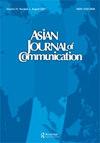台湾第一次核公投的网络观点、情绪和新闻框架:混合方法
IF 1.5
2区 文学
Q2 COMMUNICATION
引用次数: 2
摘要
摘要本研究采用大数据方法,考察台湾首次核能公投的跨平台民意,并进一步对核能新闻框架策略进行内容分析。情绪分析显示,无论媒体类型如何,对绿色核能(GGWN)公投的情感态度都是两极分化的。新闻报道和社交媒体内容在叙述公投、核能、政党相关问题方面表现出明显的情绪差异。两极分化的政党核主张倾向于表现出负面情绪。至于议程设置,大数据分析显示,政治主导了新闻、Facebook和论坛上的核叙事。此外,内容分析显示,大多数新闻文章涉及政治,但很少报道能源和环境主题。就一般新闻框架策略而言,戏剧性框架比实质性框架在核叙事中使用得更多。冲突是主要框架,其次是行动。至于环境新闻框架,大多数与ggwn相关的新闻都不是以生态为中心的。生态高效框架最常用于强调经济增长、国家发展和民生。此外,主流媒体和另类媒体在使用一般和环境新闻框架报道核公投问题方面没有显着差异。讨论了影响。本文章由计算机程序翻译,如有差异,请以英文原文为准。
Online opinions, sentiments and news framing of the first nuclear referendum in Taiwan: a mix-method approach
ABSTRACT This mixed-method study uses a big data approach to examine cross-platform public sentiments towards Taiwan’s first nuclear energy referendum, and further conducts content analysis for nuclear news framing strategies. Sentiment analysis shows polarized affective attitudes towards Go Green with Nuclear (GGWN) referendum, regardless of media types. News coverage and social media contents reveal significant sentiment differences in narrating the referendum, nuclear energy, and political party-related issues. Polarized political party-related nuclear claims tend to show negative sentiments. As for agenda setting, the big data analysis shows that politics dominate nuclear narratives on news, Facebook and forums. In addition, content analysis reveals that the majority of news articles involve politics, but rarely report on energy and environmental subjects. In terms of generic news framing strategies, dramatic framing is used more than substantive framing in nuclear narratives. Conflict is the leading framing, followed by action. As for environmental news framing, most GGWN-related news is not eco-centric. Eco-efficient framing is most used to emphasize economic growth, national development and people’s livelihood. Moreover, mainstream and alternative media show no significant differences in using generic and environmental news framing to report nuclear referendum issues. Implications are discussed.
求助全文
通过发布文献求助,成功后即可免费获取论文全文。
去求助
来源期刊

Asian Journal of Communication
COMMUNICATION-
CiteScore
3.70
自引率
0.00%
发文量
38
期刊介绍:
Launched in 1990, Asian Journal of Communication (AJC) is a refereed international publication that provides a venue for high-quality communication scholarship with an Asian focus and perspectives from the region. We aim to highlight research on the systems and processes of communication in the Asia-Pacific region and among Asian communities around the world to a wide international audience. It publishes articles that report empirical studies, develop communication theory, and enhance research methodology. AJC is accepted by and listed in the Social Science Citation Index (SSCI) published by Clarivate Analytics. The journal is housed editorially at the Wee Kim Wee School of Communication and Information at Nanyang Technological University in Singapore, jointly with the Asian Media Information and Communication Centre (AMIC).
 求助内容:
求助内容: 应助结果提醒方式:
应助结果提醒方式:


